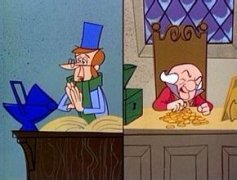The Gardener and the Family 园丁和主人-童话故事(3)
编辑:高中作文网 阅读 次“We have sought in vain,” said he; “we have been in the greenhouse and all round about!”
“No, it is certainly not there!” said the gardener; “it is only a common flower from the kitchen-garden! but, indeed, isn’t it lovely! it looks like a blue cactus, and yet it is only the flower of the artichoke.”
“You should have told us that at once!” said the master. “We imagined that it was a strange, rare flower. You have made fools of us before the princess! She saw the flower and thought it beautiful, but did not know it, and she is well up in botany, but that science has nothing to do with vegetables. How could it have entered your head, good Larsen, to send such a flower up to the house? It will make us look ridiculous!”
And the lovely blue flower which was brought from the kitchen-garden was put out of the drawing-room, where it was not at home. The master made an apology to the princess and told her that the flower was only a vegetable which the gardener had taken the idea to present, but for which he had been given a good scolding.
“That was a sin and a shame!” said the princess. “He has opened our eyes to a beautiful flower we had not noticed, he has shown us beauty where we did not expect to find it! The court gardener shall bring one up to my room every day, so long as the artichoke is in flower!”
And so it was done.
The family then told the gardener that he could again bring them a fresh artichoke flower.
“It is really beautiful!” they said, and praised the gardener.
“Larsen likes that,” said the family. “He is a spoilt child.”
In the autumn there was a terrible storm. It got so violent during the night that many of the big trees in the outskirts of the wood were torn up by the roots, and to the great sorrow of the family, but to the joy of the gardener, the two big trees with all the birds’ nests were blown down. During the storm one heard the screaming of the rooks and the crows; they beat the windows with their wings, the people in the house said.
“Now you are glad, Larsen,” said the master, “the storm has blown down the trees and the birds have gone to the woods. There are no more signs of old times; every sign and every allusion has gone; it has troubled us!”
The gardener said nothing, but he thought of what he had long intended to do-to use the lovely sunshiny place which formerly he had no control over. It should become the pride of the garden and the delight of the family. The great trees had crushed and broken the old box-hedges with all their cut shapes. He raised here a thicket of plants, home-plants from field and forest.
What no other gardener had thought of planting in the flower-garden, he set here in the kind of soil each should have, and in shade or sunshine as every kind required. He tended it in love, and it grew in magnificence.
Snow-berry bushes from the heath in Jutland, in form and colour like Italian cypress; the smooth, prickly holly, always green, in winter’s cold and summer’s sun, stood there lovely to look at. In front grew ferns, many different kinds, some looked as if they were the children of palm trees, and some as if they were the parents of the fine, lovely plant we call Venus’s hair. Here stood the slighted burdock, which in its freshness is so beautiful that it can be put in a bouquet. The burdock stood on dry ground, but lower down in the damper soil grew the colt’s-foot, also a despised plant, and yet with its fine height and huge leaves so picturesquely beautiful. Fathom high, with flower above flower, like a huge, many-armed candelabrum, the cow’s lung-wort lifted itself. Here stood the wood-ruff, the marsh-marigold, and the lily of the valley, the wild calla, and the fine three-leaved wood-sorrel. It was a delight to see.
In front, supported on wire fences, little French pear trees grew in rows; they got sun and good care, and very soon they bore big, juicy fruit, as in the country they came from.




